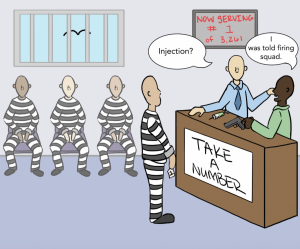Over spring break, a lot of articles surfaced concerning the trial of Nikolas Cruz, the mass shooter of Marjory Stoneman Douglas High School in Parkland, Florida. One particular article featured in The New York Times caught my eye. The article was titled “Florida Will Seek Execution of Nikolas Cruz in Parkland Shooting Trial.” Court cases that aim for the death penalty continue to surprise me for a reason that may seem very morbid and inhumane; death is an escape from an eternal surrender of freedom. Furthermore, on a more economical note, it costs more to execute someone than it does to give them life in jail without the possibility of parole. The main point of the art
 -icle was to inform the public of the prosecutors’ overall goal in regard to Cruz vs. The State of Florida. This is a very controversial topic because we, as a society, are not in a position to play God, yet we still take the decision upon ourselves to do so. Besides the obvious and logical fact that our nation is in dire need of stricter gun control, the discussion of how to deal with those who commit such atrocities rarely surfaces. Our justice system will sentence the death penalty, when deemed justifiable, but is capital punishment ever justifiable?
-icle was to inform the public of the prosecutors’ overall goal in regard to Cruz vs. The State of Florida. This is a very controversial topic because we, as a society, are not in a position to play God, yet we still take the decision upon ourselves to do so. Besides the obvious and logical fact that our nation is in dire need of stricter gun control, the discussion of how to deal with those who commit such atrocities rarely surfaces. Our justice system will sentence the death penalty, when deemed justifiable, but is capital punishment ever justifiable?
In the article, the prosecutor stated that this, “certainly is the type of case the death penalty was designed for.” In all honestly, I have no idea what that means. When were we granted the right to play God? There is nothing to gain from the execution of a wretched individual. The only major benefit is the quality of life for the prisoner being executed, since they will not have to spend the rest of their life rotting in prison.
In the simplest of terms, death is the easy way out. When considering the options that are on the table for Nikolas Cruz, they are either life in prison without parole or the death penalty. Nikolas Cruz stole the lives of seventeen innocent people and, consequently, affected hundreds of others, so why put him to death? Time is a gift, but it can also be a punishment. Locking an individual in a small space, thereby stripping them of their freedom, h as been shown to have detrimental and degradative psychological effects, not to mention, imprisonment will save taxpayer money.
as been shown to have detrimental and degradative psychological effects, not to mention, imprisonment will save taxpayer money.
Our nation is obsessed with taxes. When major elections approach, one of the first topics to emanate is taxes. In the majority of states, capital punishment, meaning lethal injection, costs more than it does to imprison someone. According to The Death Penalty Information Center, Florida would save about 51 million dollars a year if they instead sentenced prisoners on death row to life without the possibility of parole. There are currently 347 people on death rowin Florida and it costs an estimated 3.2 million dollars for each individual executed. There are a multitude of other things that money could be allocated to, such as better funding to schools, lowering rates of homelessness, or literally anything besides than killing more people.
References:
https://www.nytimes.com/2018/03/13/us/nikolas-cruz-death-penalty.html

One response to “The Death Penalty”